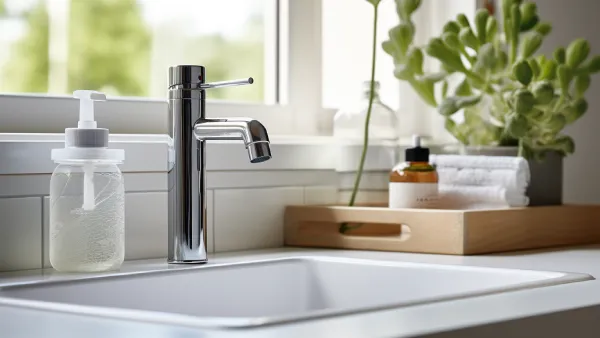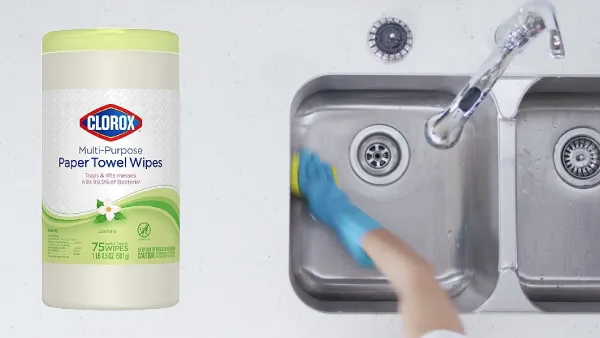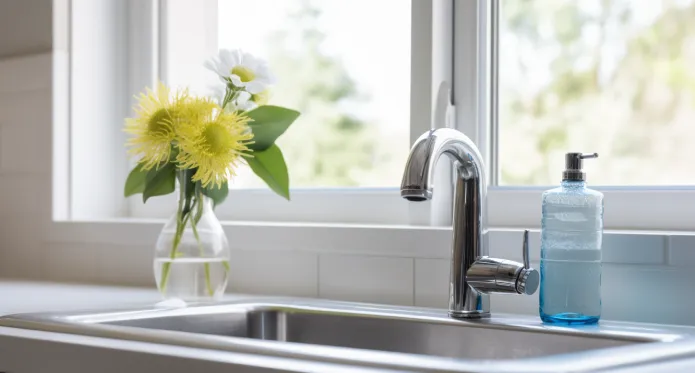Last Updated on November 14, 2023
Keeping your kitchen sink clean and hygienic provides a healthy and safe kitchen environment. But when looking for a suitable cleaner for your sink, you may want to use a bleach bathroom cleaner on kitchen sink.
While most kitchen and bathroom cleaners are interchangeable, you shouldn’t use bleach bathroom cleaner on any steel kitchen sink. Using bleach-containing cleaners can cause irreversible damage because bleach can be highly corrosive to the steel and ruin your kitchen sink’s appearance.
Bleach can also damage any surrounding fixtures or appliances made of stainless steel, such as pipes under the sink. This can lead to discoloration, pitting, and even rusting. As part of this article, we’ll discuss alternative kitchen sink cleaners to bleach. So, let’s start.
Alternatives to Bleach Bathroom Cleaner for Kitchen Sinks

Since bleach can be highly corrosive and ruin your kitchen sink’s appearance, you should use alternatives to clean your kitchen sink. There are several cleaning options you can try.
- Mild dish soap
- Baking soda
- White vinegar
- Commercial sink cleaners
- Hydrogen peroxide
- Castile soap
1. Mild Dish Soap
Mild dish soap is a safe and effective option for cleaning your sink without damaging its finish. It’s designed to cut through grease and remove food residue, making it perfect for tackling the grime accumulating in your sink.
Simply dampen a sponge or cloth with warm water, add a small amount of dish soap, and gently scrub the sink’s surface. Rinse thoroughly with lukewarm water and dry with a soft clean cloth. This method not only cleans your sink effectively but also leaves it smelling fresh and looking spotless.
2. Baking Soda
Baking soda is a natural and gentle cleaner that can effectively remove stains and odors without causing any damage to your sink’s surface. It works by breaking down dirt and grime while neutralizing unpleasant odors.
To use baking soda, simply sprinkle it onto a damp sponge or cloth and gently scrub your sink. You can also create a paste by mixing baking soda with a small amount of water and applying it to any stubborn stains. Let it settle for a while before scrubbing and rinsing thoroughly.
3. White Vinegar
White vinegar is a versatile and natural cleaning agent that’s safe to use on stainless steel or porcelain sinks. You can easily clean your kitchen sink using white vinegar and a cloth, effectively removing mineral deposits and water spots.
To clean your sink, pour some white vinegar onto a cloth or sponge. Gently scrub the sink’s surface, paying extra attention to areas with mineral deposits or water spots. The acidity of the vinegar helps break down these deposits and leaves your sink looking clean and shiny.
After scrubbing, rinse the sink thoroughly with water to remove any vinegar residue. For stubborn stains, let the vinegar sit on the surface for a few minutes before scrubbing.
4. Commercial Sink Cleaners
If you’re looking for alternatives to bleach bathroom cleaners, commercial sink cleaners offer safe options for keeping your kitchen sink clean. These cleaners are specifically formulated for kitchen sinks and are designed to be safe for various sink substances, such as granite, porcelain and stainless steel, .
When choosing a commercial sink cleaner, read the label and select one suitable for your specific sink material.
5. Hydrogen Peroxide
Hydrogen peroxide is a versatile and effective disinfectant that can help you maintain a clean, bacteria-free sink. It’s a powerful oxidizing agent that can kill many microorganisms, including bacteria and viruses.
To use hydrogen peroxide to clean your sink, simply pour a small amount onto a clean cloth or sponge and wipe down the sink surface. Let it work for a little while to allow the hydrogen peroxide to work its magic, then rinse thoroughly with water.
This method leaves no harmful residue behind since it breaks down into water and oxygen.
6. Castile Soap
When cleaning your kitchen sink, consider castile soap as a safe and environmentally-friendly alternative to bleach bathroom cleaner.
This is a plant-based soap made from vegetable oils, such as olive, coconut, or hemp oil. It’s biodegradable and contains no harsh chemicals or toxins that can harm your sink or the environment.
Castile soap is gentle yet effective in removing dirt, grime, and grease from your sink. It’s also safe to use on various sink materials, such as porcelain, stainless steel, and ceramic.
Simply dilute a small amount of castile soap in warm water, then use a sponge or cloth to scrub your sink. Rinse thoroughly with water and enjoy a clean and shiny sink without the worry of harmful chemicals or damage to the environment.
Can I use Clorox wipes to clean my kitchen sink?

Clorox wipes are considered an EPA-certified disinfectant, which means they’re effective at killing germs and bacteria on various surfaces. However, note that not all sinks are made equal. Sinkology Fireclay, vitreous china, and nickel sinks can handle the bleach in Clorox wipes without any issues.
Are baking soda and vinegar mix good for kitchen sink cleaning?
You can mix baking soda and vinegar to clean your kitchen sink effectively. This simple yet powerful combination can tackle minor clogs and leave your sink looking fresh and clean. Baking soda, a natural abrasive, helps to remove stains and odors, while vinegar, a mild acid, dissolves buildup and disinfects.
To begin, sprinkle a generous amount of baking soda on the surface of your sink. Then, slowly pour vinegar over the baking soda, causing a bubbling reaction. Allow the mixture to stand for a few minutes, giving it time to work its magic.
Why pour hydrogen peroxide down the kitchen sink drain at night?
Pouring hydrogen peroxide down your kitchen sink drain at night helps to disinfect and reduce germs, keeping your pipes clean and odor-free. Hydrogen peroxide is an effective cleaning agent that dissolves organic matter and overnight loosens debris, such as skin cells.
This powerful solution not only cleans your sink but also works to reduce germs inside your pipes, ensuring a hygienic environment. Hydrogen peroxide helps prevent clogs and maintain the proper flow of water through your drain by breaking down and flushing away organic matter.
Also, the disinfecting properties of hydrogen peroxide eliminate any unpleasant odors, leaving your sink smelling fresh and clean.
Keep Your Sink Clean and Well-Maintained to Keep Your Kitchen Healthy
Using bleach bathroom cleaner on your kitchen sink is not the best idea because of its corrosive nature. There are safer alternatives available that can effectively clean your sink without causing any damage.
The best way to maintain hygiene is to clean your kitchen sink regularly with a suitable cleaner. While Clorox wipes can be used, a baking soda and vinegar mix is also a great option for cleaning your kitchen sink. Also, pouring hydrogen peroxide into the kitchen sink drain at night can help eliminate any unpleasant odors.
By using these safe alternatives, you can maintain your kitchen sink’s hygiene and protect it from abrasion and corrosion.

